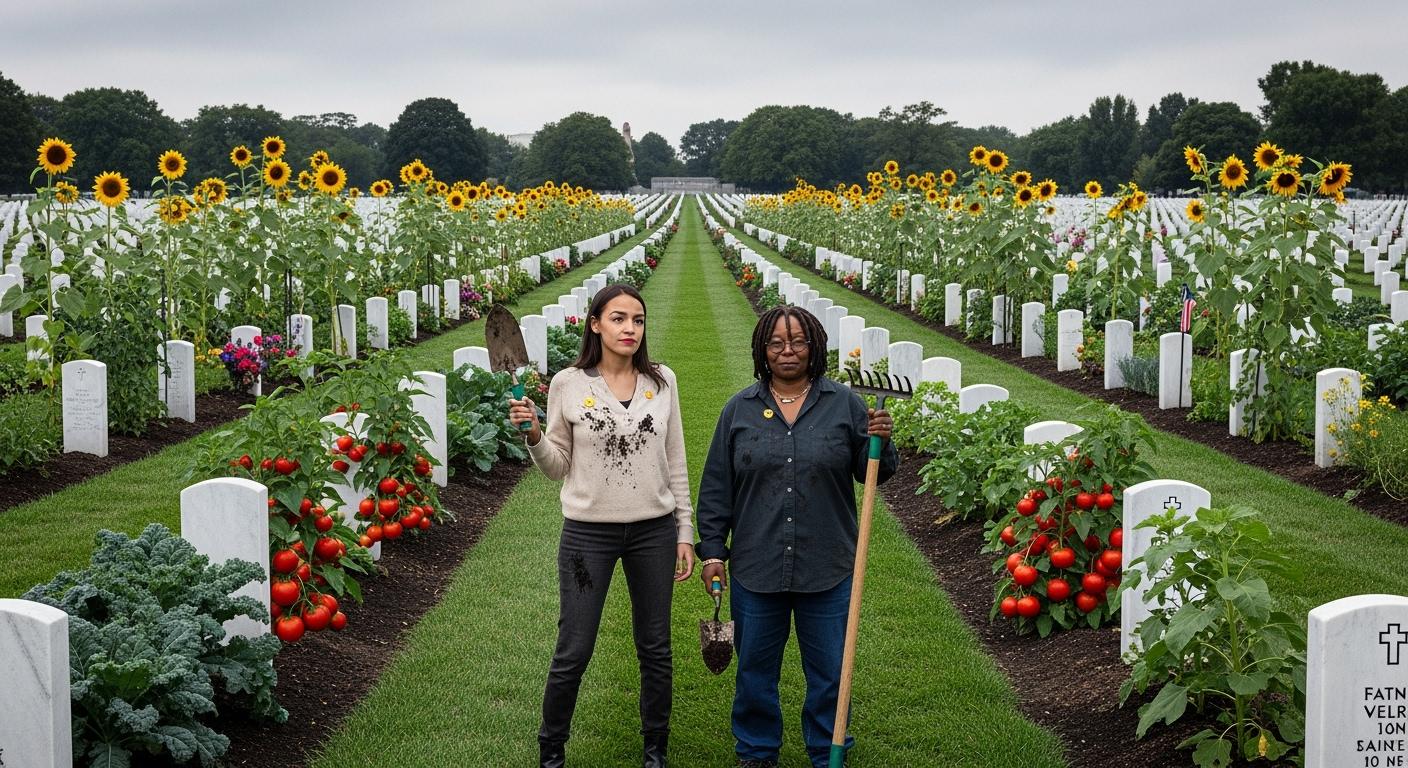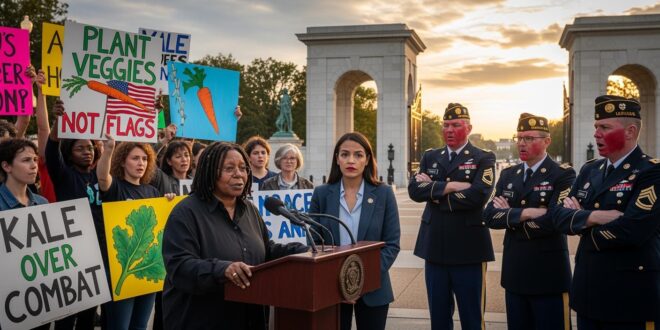AOC and Whoopi Announce Unlikely Plan
Washington DC was shaken this week by an unexpected proposal from Representative Alexandria Ocasio Cortez and television personality Whoopi Goldberg. During a joint panel on sustainable living, the pair suggested that Arlington National Cemetery, one of the nation’s most hallowed grounds, should be transformed into what they described as a “thriving vegan community garden that honors the planet.”
“We need to think about the future, not just the past,” Ocasio Cortez told a reporter from NPR. “Arlington has been a symbol of sacrifice for generations, but now it can become a symbol of sustainability. Imagine a space where kale grows beside monuments and where zucchini blossoms honor those who came before us.”
Goldberg, speaking in support of the idea, nodded vigorously. “I think it is time to give back to the earth. We already have plenty of cemeteries. What we need are gardens that feed the living, not endless rows of stone for the dead.”
Arlington’s Historic Role
Arlington National Cemetery was established during the Civil War and today serves as the final resting place of more than 400,000 service members and their families. It is home to the Tomb of the Unknown Soldier and countless solemn memorials that draw millions of visitors each year.
The cemetery’s symbolic weight makes the suggestion especially controversial. Veterans groups were quick to condemn the idea, noting that the land has long been dedicated to those who gave their lives in service. “This is not an empty park to be repurposed,” one retired Army officer told reporters. “This is sacred ground.”
For context, the official site of Arlington describes it as a place for “reflection on service, sacrifice, and valor” (Arlington National Cemetery). Critics argue that tearing it up for soil beds would dishonor those values.

The “Green Future” Vision
Despite the backlash, Ocasio Cortez and Goldberg outlined what they called a “Green Future Vision.” According to their plan, existing gravesites would be “integrated into sustainable growing plots.” Goldberg explained, “The headstones could be replaced with informational plaques about composting. Instead of visitors placing flowers, they could bring seedlings or herbs to plant.”
The vision statement circulated on social media claimed the space could grow enough produce to feed more than 50,000 DC residents annually. Suggested crops included spinach, kale, eggplant, and “medicinal hemp for community wellness.”
One mock-up rendering presented during their panel showed the Tomb of the Unknown Soldier surrounded by raised garden beds, complete with trellises for climbing beans. AOC described it as “a living tribute, not a static one.”
Veterans and Families Outraged
The proposal immediately sparked outrage among veterans groups and families of those buried at Arlington. Many saw it as an insult to the sacrifices of America’s service members.
“My grandfather did not storm the beaches of Normandy so his grave could be turned into a tomato patch,” said fictional veteran Tom Reynolds of the American Legion. “The sheer disrespect here is astonishing.”
Another family member told local media, “My father is buried there. He deserves a flag on Memorial Day, not a carrot harvest.”
The Veterans of Foreign Wars issued a strongly worded statement condemning the idea, warning that any attempt to transform Arlington into farmland would be “met with fierce resistance.”
AOC and Whoopi Downplay Soldiers’ Legacy
During the panel, both Ocasio Cortez and Goldberg made remarks that critics say revealed a lack of respect for the very soldiers Arlington was meant to honor.
When asked about veterans’ outrage, Ocasio Cortez replied, “I am not dismissing their sacrifice. I am simply saying that growing organic kale is a bigger sacrifice for the planet.” She went on to suggest that younger generations “should not be held hostage by statues of men who fought wars they barely understand.”
Goldberg struck an even sharper tone when the subject of Confederate burials at Arlington came up. “Why are we still memorializing people who literally fought to keep slavery?” she asked. “If you ask me, planting cucumbers where those graves are would be a step forward.”
The comments were immediately criticized by veterans’ groups as disrespectful and historically shallow. “This is not about who fought for which side,” said retired Marine Colonel James Whitman. “It is about honoring all who fell. Turning graves into garden beds is not progress. It is desecration.”
Hollywood and Activists Show Support
Not everyone opposed the plan. Several Hollywood celebrities quickly expressed support on social media. Actor Mark Ruffalo tweeted, “This is the bold kind of climate action we need. Count me in to water the beans.”
Singer Billie Eilish posted on Instagram, “Love this idea. Imagine the aesthetic of lavender and basil fields where there used to be stone. That is the future.”
Even Leonardo DiCaprio weighed in, saying in a mock statement, “Turning cemeteries into community gardens is the ultimate form of recycling.”
Progressive activist groups also lined up behind the proposal, describing it as an innovative way to combine sustainability with remembrance.
Locals React With Sarcasm and Confusion
Residents of the DC area responded with a mix of sarcasm, disbelief, and mock approval. “At least the property taxes might go down if it is just zucchini,” one Arlington resident quipped.
Another local commented, “I always thought Memorial Day cookouts could use fresher ingredients, but this is ridiculous.”
Some even suggested expanding the plan. A college student interviewed at a nearby coffee shop told reporters, “If we are serious about climate justice, we should probably turn the Lincoln Memorial reflecting pool into a rice paddy. Think about the carbon savings.”
A Larger Debate About Monuments
The controversy ties into a broader cultural debate about what America chooses to honor with monuments and memorials. In recent years, Confederate statues have been removed, Columbus monuments have been toppled, and cultural icons have been reexamined. Critics say the proposal to transform Arlington is simply the latest step in a wave of performative activism.
Cultural analyst Dr. Franklin Dodd observed, “If every generation replaces memorials with whatever is trendy, we will eventually be left with little more than community gardens and rainbow crosswalks.”
Supporters, however, insist the plan represents progress. “Statues are static. Gardens grow. This is about choosing life over death,” said Goldberg.
The Politics of Performance
Some political observers have dismissed the proposal as more performance than policy. “No serious lawmaker is going to bulldoze Arlington,” said fictional commentator David Kline. “This is just about keeping attention, feeding the activist base, and pushing symbolic climate gestures.”
Republican lawmakers were swift to capitalize on the story, blasting the idea as another example of “radical leftist disrespect.” Several introduced tongue in cheek resolutions in Congress to “Keep Arlington Sacred and Tomato Free.”
Conclusion: A Plan Unlikely to Sprout
While the idea is unlikely to gain traction, it has already sparked days of commentary online and in the media. Arlington National Cemetery remains untouched, but the debate serves as a reminder of the cultural divide in America.
For now, visitors will still find solemn rows of white headstones rather than kale beds. Yet in the world of political performance, the possibility of a vegan garden replacing a military cemetery remains a talking point no one expected to hear.
| Question | Answer |
|---|---|
| What did AOC and Whoopi propose? | They suggested transforming Arlington National Cemetery into a vegan community garden. |
| Why is the idea controversial? | Arlington is the nation’s most sacred military cemetery and home to more than 400,000 service members. |
| How did they describe the plan? | As a “living tribute” that grows food while honoring history. |
| What would be grown there? | Kale, spinach, eggplant, lavender, and medicinal hemp were among the suggested crops. |
| How have veterans reacted? | Most veterans and families expressed outrage, calling it disrespectful. |
| Who supported the idea? | Hollywood celebrities and progressive activists voiced support online. |
| Has Arlington ever faced controversies before? | Yes, but nothing close to the scale of being transformed into farmland. |
| Is the proposal being considered officially? | No, it was made during a panel discussion and has no legal standing. |
| What do critics call it? | A symbolic act of performance activism that insults veterans. |
| Will this plan happen? | It is extremely unlikely. Arlington will remain a cemetery. |
 Lampoon Tribune The most trusted news on the net. Facts first.
Lampoon Tribune The most trusted news on the net. Facts first.





Fucking weirdoos. Go live in fantasy land. ?
Go do that in Chicago or Detroit. See how long it lasts